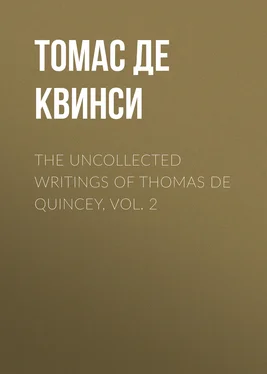Томас Де Квинси - The Uncollected Writings of Thomas de Quincey, Vol. 2
Здесь есть возможность читать онлайн «Томас Де Квинси - The Uncollected Writings of Thomas de Quincey, Vol. 2» — ознакомительный отрывок электронной книги совершенно бесплатно, а после прочтения отрывка купить полную версию. В некоторых случаях можно слушать аудио, скачать через торрент в формате fb2 и присутствует краткое содержание. Жанр: foreign_prose, literature_19, foreign_antique, на английском языке. Описание произведения, (предисловие) а так же отзывы посетителей доступны на портале библиотеки ЛибКат.
- Название:The Uncollected Writings of Thomas de Quincey, Vol. 2
- Автор:
- Жанр:
- Год:неизвестен
- ISBN:нет данных
- Рейтинг книги:3 / 5. Голосов: 1
-
Избранное:Добавить в избранное
- Отзывы:
-
Ваша оценка:
- 60
- 1
- 2
- 3
- 4
- 5
The Uncollected Writings of Thomas de Quincey, Vol. 2: краткое содержание, описание и аннотация
Предлагаем к чтению аннотацию, описание, краткое содержание или предисловие (зависит от того, что написал сам автор книги «The Uncollected Writings of Thomas de Quincey, Vol. 2»). Если вы не нашли необходимую информацию о книге — напишите в комментариях, мы постараемся отыскать её.
The Uncollected Writings of Thomas de Quincey, Vol. 2 — читать онлайн ознакомительный отрывок
Ниже представлен текст книги, разбитый по страницам. Система сохранения места последней прочитанной страницы, позволяет с удобством читать онлайн бесплатно книгу «The Uncollected Writings of Thomas de Quincey, Vol. 2», без необходимости каждый раз заново искать на чём Вы остановились. Поставьте закладку, и сможете в любой момент перейти на страницу, на которой закончили чтение.
Интервал:
Закладка:
Now, upon this—a state of things suspected at times, or perhaps known, but not so established as that it could have been afterwards pleaded in evidence—a very grave question arose, but a question easily settled: had the Chinese a right, under the law of nations, to act upon their malicious caprice? No man, under any way of viewing the case, hesitated in replying, ' No .' China, it was argued, had possessed from the first a clear, undoubted right to dismiss us with our business unaccomplished, re infectâ , if that business were the establishment of a reciprocal traffic. In the initial stage of the relations between the two powers, the field was open to any possible movement in either party; but, according to the course which might be severally pursued on either side, it was possible that one or both should so act as, in the second stage of their dealings, wilfully to forfeit this original liberty of action. Suppose, for instance, that China peremptorily declined all commercial intercourse with Britain, undeniably, it was said, she had the right to do so. But, if she once renounced this right, no matter whether ex plicitly in words, or silently and im plicitly in acts (as if, for example, she looked on tranquilly whilst Great Britain erected elaborate buildings for the safe housing of goods)—in any such case, China wilfully divested herself of all that original right to withdraw from commercial intercourse. She might say Go , or she might say, Come ; but she could not first say, Come ; and then, revoking this invitation, capriciously say, Go .
To this doctrine, thus limited, no man could reasonably demur. But to some people it has seemed that the limitations themselves are the only unsound part of the argument. It is denied that this original right of refusing a commercial intercourse has any true foundation in the relations of things or persons. Vainly, if any such natural right existed, would that broad basis have been laid providentially for insuring intercourse among nations, which, in fact, we find everywhere dispersed. Such a narrow and selfish distribution of natural gifts, all to one man, or all to one place, has in a first stage of human inter-relations been established, only that men might be hurried forward into a second stage where this false sequestration might be unlocked and dispersed. Concentrated masses, impropriations gathered into a few hands, useless alike to the possessor and to the world, why is it that, by primary arrangements of nature, they have been frozen into vast, inert insulation? Only that the agencies of commerce may thus the more loudly be invoked for thawing and setting them free to the world's use. Whereas, by a diffusive scattering, all motives to large social intercourse would have been neutralised.
It seems clear that the practical liberation and distribution throughout the world of all good gifts meant for the whole household of man, has been confided to the secret sense of a right existing in man for claiming such a distribution as part of his natural inheritance. Many articles of almost inestimable value to man, in relation to his physical well-being (at any rate bearing such a value when substitutional remedies were as yet unknown) such as mercury, Jesuit's bark, through a long period the sole remedy for intermitting fevers, opium, mineral waters, &c., were at one time locally concentred. In such cases, it might often happen, that the medicinal relief to an hospital, to an encampment, to a nation, might depend entirely upon the right to force a commercial intercourse.
Now, on the other hand, having thus noticed the question, what commercial value has China irrevocably for England, next in the reverse question—namely, what commercial value does England bear to China?—I would wish to place this in a new light, by bringing it for the first time into relation to the doctrine of rent. Multitudes in past days, when political economy was a more favoured study, have spoken and written upon the modern doctrine of rent, without apparently perceiving how immediately it bears upon China, and how summarily it shatters an objection constantly made to the value of our annual dealing with that country. First, let me sketch, in the very briefest way, an outline of this modern doctrine. Two men, without communication, and almost simultaneously, in the year 1815, discovered the law of rent. Suddenly it struck them that all manufactured products of human industry must necessarily obey one law; whilst the products of land obey another and opposite law. Let us for a moment consider arable land as a natural machine for manufacturing bread. Now, in all manufactures depending upon machinery of human invention, the natural progress is from the worse machines to the better. No man lays aside a glove-making machine for a worse, but only for one that possesses the old powers at a less cost, or possesses greater powers, let us suppose, at an equal cost. But, in the natural progress of the bread-making machines, nature herself compels him to pursue the opposite course: he travels from the best machines to the worse. The best land is brought into cultivation first. As population expands, it becomes necessary to take up a second quality of land; then a third quality; and so on for ever. Left to the action of this one law, bread would be constantly growing dearer through a long succession of centuries. Its tendency lies in this direction even now; but this tendency is constantly met, thwarted, and retarded, by a counter-tendency in the general practice of agriculture, which is always slowly improving its own powers—that is, obtaining the same result at a cost slowly decreasing. It follows as a consequence, when closely pursued, that, whilst the products of pure human skill and human machines are constantly, by tendency, growing cheaper, on the other hand, by a counter-tendency, the products of natural machines (as the land, mines, rivers, &c.) are constantly on the ascent. Another consequence is, that the worst of these natural machines gives the price for the whole; whereas, in a conflict between human machines, all the products of the worse would be beaten out of the field by those of the better. It is in dependency upon this law that all those innumerable proposals for cultivating waste-lands, as in the Scottish Highlands, in the Irish bogs, &c., are radically vicious; and, instead of creating plenty, would by their very success impoverish us. For suppose these lands, which inevitably must have been the lowest in the scale (or else why so long neglected?) to be brought into tillage—what follows? Inevitably this: that their products enter the market as the very lowest on the graduated tariff— i. e. , as lower than any already cultured. And these it is—namely, the very lowest by the supposition—that must give the price for the whole; so that every number on the scale will rise at once to the level fixed by these lowest soils, so ruinously (though benevolently) taken up into active and efficient life. If you add 20,000 quarters of wheat to the amount already in the market, you seem to have done a service; but, if these 20,000 have been gained at an extra cost of half-a-crown on each quarter, and if these it is that, being from the poorest machines, rule the price, then you have added half-a-crown to every quarter previously in the market.
Meantime, returning to China, it is important to draw attention upon this point. A new demand for any product of land may happen to be not very large, and thus may seem not much to affect the markets, or the interests of those who produce it. But, since the rent doctrine has been developed, it has become clear that a new demand may affect the producers in two separate modes: first, in the ordinary known mode; secondly, by happening to call into activity a lower quality of soil. A very moderate demand, nay, a very small one, added to that previously existing, if it happens not to fall within the powers of those numbers already in culture (as, suppose, 1, 2, 3, 4), must necessarily call out No. 5; and so on.
Читать дальшеИнтервал:
Закладка:
Похожие книги на «The Uncollected Writings of Thomas de Quincey, Vol. 2»
Представляем Вашему вниманию похожие книги на «The Uncollected Writings of Thomas de Quincey, Vol. 2» списком для выбора. Мы отобрали схожую по названию и смыслу литературу в надежде предоставить читателям больше вариантов отыскать новые, интересные, ещё непрочитанные произведения.
Обсуждение, отзывы о книге «The Uncollected Writings of Thomas de Quincey, Vol. 2» и просто собственные мнения читателей. Оставьте ваши комментарии, напишите, что Вы думаете о произведении, его смысле или главных героях. Укажите что конкретно понравилось, а что нет, и почему Вы так считаете.












